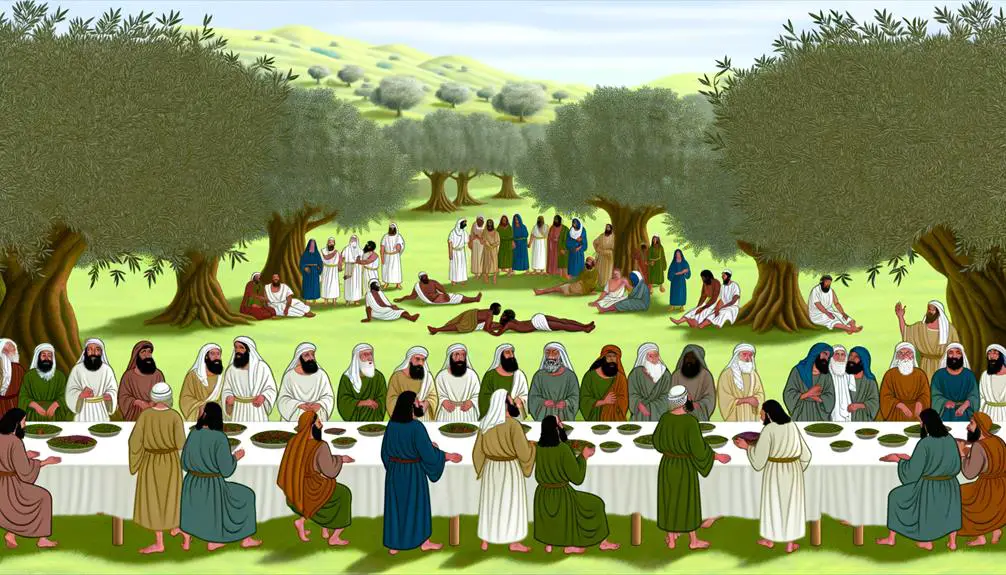Highlighting the importance of 'clean meats' in the Bible, discover how these dietary laws intertwine with ancient ethics and spirituality…

Clean Meats in the Bible
In the Bible, 'clean meats' refer to specific animal foods deemed permissible under ancient Israelite dietary laws, primarily outlined in Leviticus and Deuteronomy. These clean meats include animals that chew the cud and have cloven hooves. The categorization of meats into 'clean' and 'unclean' is vital for maintaining ritual purity, an essential component of the covenant between Israelites and God. These laws not only shaped religious observances but also reinforced social customs. Ethically, the scripture mandates compassionate treatment of animals, aligning with broader spiritual and community obligations. By understanding these principles, you'll appreciate the intricate relationship between dietary choices and broader ethical considerations.
Key Takeaways
- Clean meats in the Bible refer to animal foods deemed permissible under dietary laws in Leviticus and Deuteronomy.
- Criteria for clean meats include animals that chew the cud and have cloven hooves.
- These dietary laws were established to set the Israelites apart and reflect their covenant with God.
- Clean meats are considered nutritionally beneficial, rich in proteins, vitamins, and omega-3 fatty acids.
- The concept of clean meats shapes religious observances and social customs, influencing food preparation and consumption.
Definition of Clean Meats

In biblical contexts, 'clean meats' refer to animal foods deemed permissible for consumption under specific dietary laws outlined in Leviticus and Deuteronomy. These texts categorize meats into 'clean' and 'unclean' based on various criteria, fundamentally influencing the dietary practices of observant communities historically and in contemporary settings. This distinction is pivotal in understanding the broader implications of meat classifications within historical diets.
Analyzing the criteria for these classifications, you'll find that they are not arbitrary but are deeply rooted in cultural, environmental, and possibly health-related considerations of the time. For instance, 'clean' animals typically include those that chew the cud and have cloven hooves, such as cattle, sheep, and goats. This classification not only reflects a methodical approach to diet but also aligns with the pastoral lifestyles prevalent among ancient Hebrews, where such animals were integral to their economy and way of life.
The designation of clean and unclean meats affected food procurement, preparation, and consumption patterns, shaping social customs and religious observances. Consequently, the inclusion of meat classifications in religious texts was not merely a dietary guideline but a component of a holistic socio-religious ecosystem. Understanding this helps you appreciate the complex interplay between dietary laws and historical diets.
Biblical Basis for Dietary Laws
Understanding the classifications of clean and unclean meats naturally leads us to explore the scriptural directives that established these dietary laws. Within the Old Covenant, particularly in Leviticus and Deuteronomy, you'll find that these laws are not merely arbitrary but steeped in the historical context and religious practices of the ancient Israelites.
Here's a quick reference to help you understand the basis and implications of these dietary laws:
Reference |
Description |
|---|---|
Leviticus 11 |
Details on clean and unclean animals |
Deuteronomy 14 |
Reiteration and expansion of dietary laws |
Exodus 22:31 |
Regulations on consuming meat from torn animals |
The ritual significance of these laws is profound. They were designed not just to govern physical health but to set the Israelites apart from surrounding nations, reflecting their unique covenant with God. These regulations helped shape a collective identity and served as a daily reminder of their spiritual obligations and purity.
Analyzing these texts, you'll notice that the laws are meticulously detailed, indicating a divinely ordained order to everyday life. This structured approach to diet was integral to maintaining holiness in communal and personal spheres, emphasizing obedience and reverence towards God.
Health Implications of Clean Meats

Analyzing the health implications of clean meats, you'll discover that these dietary choices are not only deeply rooted in spiritual tradition but also potentially beneficial for physical well-being. The nutritional analysis of clean meats, such as beef, lamb, and certain types of fish, often reveals a high content of essential nutrients including proteins, omega-3 fatty acids, and various vitamins and minerals critical for maintaining good health. These substances are important for muscle repair, brain function, and overall energy levels.
However, you must also consider the allergy risks associated with any dietary choice. Clean meats, while generally safe for many, can still pose allergenic potential, especially in forms like shellfish or certain kinds of fish known to trigger reactions in susceptible individuals.
To encapsulate the key points:
- Nutritional Benefits: Rich in proteins and essential fatty acids, clean meats offer significant health benefits.
- Allergy Risks: Be mindful of potential allergic reactions, particularly with seafood.
- Cultural and Spiritual Alignment: Eating clean meats aligns with specific spiritual directives, potentially enhancing psychological and emotional health.
As you weigh these factors, remember that personal health responses can vary, and adapting dietary choices to individual needs and medical advice is important.
Ethical Considerations in Scripture
As you explore the ethical considerations in Scripture, it's vital to examine the compassion for living creatures, a recurring theme that aligns with humane treatment and respect for life. Additionally, stewardship and creation care are presented not just as duties but as moral imperatives that underscore our responsibility to protect and sustain the environment. Finally, the prophetic diet messages offer insights into how dietary choices can reflect spiritual and ethical commitments, urging a thoughtful consideration of the foods we consume.
Compassion for Living Creatures
Scriptural texts often emphasize the importance of compassion toward living creatures as a fundamental ethical imperative. You're urged to contemplate the breadth of this compassion, which extends beyond mere avoidance of cruelty, embedding deeper principles of animal empathy and creature rights within its teachings.
- Animal Empathy: Understanding and sharing the feelings of animals, recognizing them as sentient beings with needs and emotions.
- Creature Rights: Acknowledging the inherent rights of all living creatures to live free from suffering and exploitation.
- Biblical Mandates: Numerous passages advocate for kind and ethical treatment of animals, suggesting a divine expectation for humanity's responsibility.
These elements collectively encourage a scholarly reevaluation of how you interact with and perceive the animal world in your daily life and spiritual practices.
Stewardship and Creation Care
In biblical teachings, you're called to act as stewards of the Earth, a role that encompasses ethical responsibilities toward the environment and all its inhabitants. This stewardship is rooted in environmental theology, which interprets Scripture as a directive for sustainable living and conservation. The ethical dimensions expounded in ecological sermons often emphasize how the degradation of nature is not just a physical act but a moral failing. As stewards, you're encouraged to engage in practices that preserve and restore the Earth, seeing this as a form of worship and obedience to divine instructions. This perspective not only aligns with ancient texts but also resonates with contemporary concerns about ecological sustainability, urging a reevaluation of how you interact with the natural world.
Prophetic Diet Messages
Exploring the Bible reveals profound insights into the ethical reflections of dietary practices, urging you to contemplate on the moral implications of your food choices. Scripture doesn't just dictate what to eat but also encompasses how and why certain foods are chosen, underlining a broader spiritual and ethical dialogue:
- Eschatological Nutrition: Prophetic visions often hint at a divinely prescribed diet, suggestive of an ultimate plan for human consumption that aligns with spiritual purity and prophetic fulfillment.
- Divine Consumption: This concept emphasizes eating in a manner that honors God's creation, highlighting sustainability and compassion.
- Ethical Treatment of Animals: Biblical texts frequently advocate for humane treatment, reflecting a deep concern for animal welfare within the context of dietary laws.
These elements encourage you to reflect on deeper ethical dimensions in your dietary choices.
Cultural Impact of Dietary Rules
In examining the cultural impact of dietary rules, you'll find that these guidelines are pivotal in forming religious identities. They not only foster social cohesion among community members but also greatly mold perceptions of health. This intersection of diet, culture, and religion offers a profound lens through which to understand collective behavioral patterns and values.
Religious Identity Formation
Shaping religious identities, dietary rules greatly influence how communities perceive and practice their faith. By adhering to specific dietary laws, you're not just choosing what to eat; you're often engaging in identity politics and reinforcing spiritual symbolism inherent within your community. This expression of faith through food choices serves as a profound marker of religious identity.
- Identity Affirmation: Dietary practices affirm group belonging and differentiate from others.
- Spiritual Symbolism: Foods become imbued with spiritual meanings, extending beyond mere sustenance.
- Historical Continuity: Adhering to ancient dietary laws connects current practitioners with their ancestral past.
These aspects underscore how deeply intertwined dietary rules are with the fabric of religious life, molding your sense of belonging and spiritual engagement.
Social Cohesion Enhancement
Dietary rules greatly enhance social cohesion by fostering shared rituals and values within religious communities. You'll find that these regulations not only dictate what should be eaten but also shape how community members interact during meals, notably during community feasts. Social rituals around food, especially those considered clean, create a sense of belonging and collective identity. For instance, the communal preparation and consumption of clean meats during religious festivals not only affirm individual and collective religious commitments but also reinforce social bonds among participants. These meals become a physical manifestation of theological principles, turning abstract beliefs into concrete, communal experiences. This integration of dietary laws and social interaction helps cement social unity within the group, making the dietary rules an essential pillar of communal life.
Health Perceptions Shaped
Beyond influencing social cohesion, dietary rules profoundly shape your perceptions of health and wellness within cultural contexts. These rules often dictate what is considered clean or unclean, directly impacting your dietary choices and health routines. The distinction between clean and unclean meats in biblical texts isn't just theological; it molds your understanding of nutritious eating and safe food preparation.
- Nutritional Myths: Beliefs about which meats are purer or healthier can lead to widely accepted myths that influence diet.
- Cooking Methods: Prescribed methods for preparing meats are rooted in maintaining purity, which can affect nutritional content.
- Health Standards: Historical religious texts often set the bar for what is deemed healthy within a community, impacting public health policies.
These elements collectively contribute to a holistic cultural view of health.
Modern Interpretations and Practices
In contemporary religious communities, you'll find that interpretations of what constitutes 'clean meats' have evolved greatly, reflecting broader theological, cultural, and health-oriented discussions. This shift is deeply rooted in historical context, where traditional dietary laws outlined in Levitical texts were straightforward yet deeply symbolic, aimed at setting a community apart. However, with technological advancements, the production, processing, and even the genetic makeup of meats have changed, prompting a reassessment of these ancient guidelines.
You might note that in modern settings, religious leaders and scholars often revisit scriptural texts to align ancient teachings with contemporary realities. This includes considerations of how meat is raised and processed, emphasizing ethical and sustainable practices that align with broader moral teachings of stewardship and compassion. For example, the rise of lab-grown meats or 'clean meats' presents a new dilemma: they do not directly involve traditional animal farming, yet they are genetically identical to conventional meats.
Moreover, the expansion of global trade and increased intercultural interactions have introduced a variety of meats previously unfamiliar to different religious communities, necessitating a broader interpretative framework. This dynamic interpretation guarantees that dietary laws remain relevant and meaningful, nurturing a continuous dialogue between ancient texts and modern practices.
Comparisons With Unclean Meats

Often, you'll find that the distinctions between clean and unclean meats are not merely about dietary status but encapsulate deeper, symbolic divides rooted in scriptural mandates. In the historical context of the Bible, these distinctions are profoundly tied to notions of purity and community identity. The ritual significance of consuming or avoiding certain meats was central to maintaining a distinct Israelite identity amidst surrounding nations.
To understand these divides, consider these key points:
- Scriptural Listings: Clean animals, such as certain mammals with split hooves and that chew the cud, and specific fish with fins and scales, are distinguished from unclean ones like pigs and shellfish, which don't meet these criteria.
- Purity Laws: The consumption of clean meats is presented not just as a health guideline but as a requirement for ritual purity. Eating unclean meats could render one spiritually unclean, impacting community interactions and participation in sacred rituals.
- Symbolic Meanings: Unclean animals often symbolize chaos or moral disorder in biblical texts, whereas clean animals represent order and sanctity.
These distinctions underscore a broader theological framework where dietary laws serve both practical and symbolic roles in shaping and reinforcing communal and spiritual life.
Influence on Contemporary Diets
While the biblical distinctions between clean and unclean meats were rooted in ancient ritual purity, today's dietary choices are influenced by a complex interplay of health awareness, ethical considerations, and environmental concerns. You're now facing a world where climate influence weighs heavily on your food decisions. The environmental impact of traditional meat production, with its high carbon footprint and resource-intensive processes, pushes you toward more sustainable alternatives.
Technological advancements play a critical role in this shift. Innovations such as lab-grown meats, which scientists cultivate from animal cells, offer a promising solution. These meats don't require the slaughtering of animals, addressing ethical concerns while also drastically reducing the environmental impact associated with conventional livestock farming. You're observing how these developments not only align with your moral values but also cater to a heightened health consciousness that seeks to minimize the intake of antibiotics and hormones often found in traditionally farmed meat.
As you navigate these choices, it's important to ponder how each option aligns with your personal and community values, health objectives, and the broader ecological footprint. Your diet isn't just about nourishment; it's a reflection of your stance on larger societal issues.
Frequently Asked Questions
How Did Biblical Dietary Laws Affect Trade in Ancient Times?
Imagine traversing ancient trade routes; biblical dietary laws greatly influenced these journeys. They dictated cultural adaptations, guiding economic implications by restricting certain goods, consequently shaping trade dynamics profoundly in surrounding regions.
Are There Any Lost Clean Meats Mentioned in Non-Canonical Texts?
You'll find that apocryphal texts do mention lost clean meats, expanding textual interpretations of diets. These references deepen understanding of ancient dietary customs, albeit outside mainstream religious teachings.
How Do Different Christian Denominations View Clean Meats Today?
You'll find that denominational differences shape how modern interpretations of clean meats are viewed. Each Christian group may have distinct theological stances influenced by varying interpretations of scriptural texts and dietary guidelines.
Were There Any Notable Historical Figures Who Opposed These Dietary Laws?
In examining reform movements, you'll find figures like Martin Luther, who opposed traditional dietary laws, viewing them through a lens of cultural resistance and advocating for a more personal interpretation of religious practices.
How Do Clean Meat Practices Compare Across Different Religions?
You'll find that clean meat practices vary widely across religions, shaped by deep cultural influences and ritual significance, each embedding unique dietary frameworks that reflect theological teachings and historical adaptations within different faiths.



Sign up